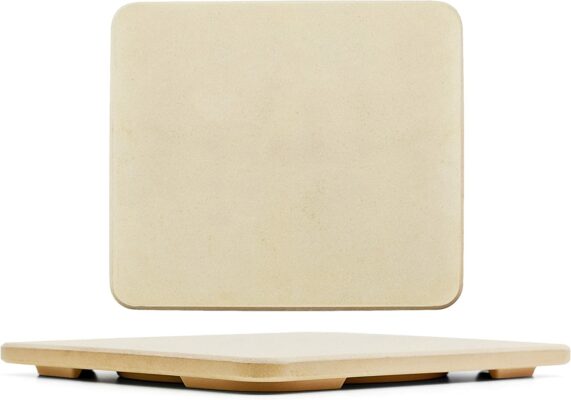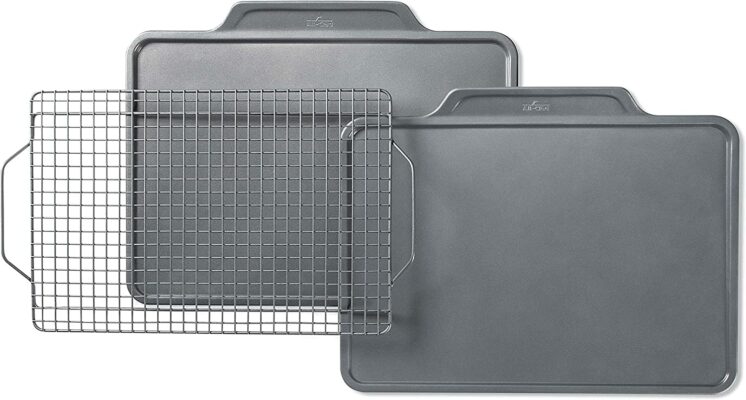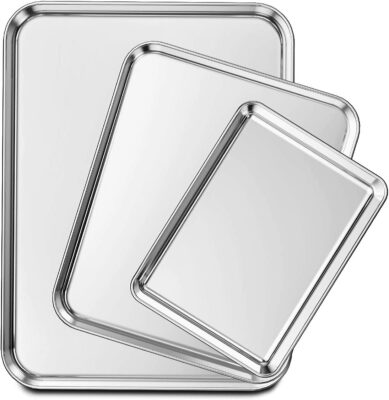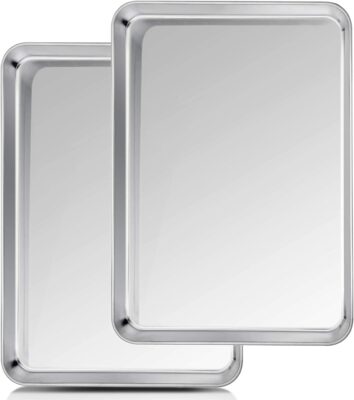Baking is a popular pastime that many people enjoy, but it’s important to ensure that your tools and materials are safe and healthy. This is where non-toxic baking sheets come in.
The importance of non-toxic kitchen appliances cannot be overstated, especially when it comes to baking sheets.
Non-toxic baking sheets are crucial for maintaining a healthy kitchen environment, as they are made without harmful chemicals and materials that can pose a risk to your health and the environment.
One of the key benefits of using non-toxic baking sheets is that they are safe for your health. Traditional baking sheets that are coated with harmful materials, such as Teflon, can release toxic fumes when heated to high temperatures.
These fumes can cause various health issues, including flu-like symptoms, organ damage, and cancer. Non-toxic baking sheets, on the other hand, are free from these harmful chemicals, making them a safer option for your health.
Non-toxic baking sheets are also better for the environment. Traditional baking sheets containing harmful chemicals can release these chemicals into the environment when disposed of.
Non-toxic baking sheets are made with environmentally-friendly materials and are a more sustainable option.
In this blog, we will explore the different types of non-toxic baking sheets, their benefits, and how to choose and care for them.
What Are Non-Toxic Baking Sheets?
Baking is a fun and enjoyable activity that many people love to do. However, not all baking sheets are created equal. Some baking sheets can contain toxic chemicals that can be harmful to your health and the environment. This is where non-toxic baking sheets come into play.
Non-toxic baking sheets are made without any harmful chemicals or materials that could potentially harm you or the environment.
These baking sheets are typically made with materials such as ceramic, stainless steel, silicone, or glass, which are known for being safe and non-toxic.
One of the main reasons you should use non-toxic baking sheets is for your health. Traditional baking sheets that are coated with non-stick materials, such as Teflon, can release harmful chemicals when exposed to high heat.
These chemicals can harm your health and even cause long-term health problems. Non-toxic baking sheets, on the other hand, are free from harmful chemicals and are a safer option for your health.
Additionally, non-toxic baking sheets are also better for the environment. Traditional baking sheets containing harmful chemicals can release into the atmosphere when disposed of.
Non-toxic baking sheets, on the other hand, are made with environmentally-friendly materials and are a more sustainable option.
Overall, using non-toxic baking sheets is a simple way to ensure you are baking safely and sustainably.
By choosing non-toxic baking sheets, you can enjoy baking without worrying about the potential health or environmental risks associated with traditional baking sheets.
What Types of Baking Sheets Should You Avoid?
When it comes to baking sheets, it’s important to know which types to avoid to ensure that you are not exposing yourself or your loved ones to harmful chemicals. One type of baking sheet that should be avoided is those made with Teflon.
Teflon is a non-stick coating that is commonly used on baking sheets, but it contains a harmful chemical called perfluorooctanoic acid (PFOA).
This chemical can release toxic fumes when heated to high temperatures, which can cause a range of health issues, including flu-like symptoms, organ damage, and cancer.
Additionally, Teflon coatings can wear off over time, exposing the metal beneath them and potentially contaminating your food.
Another type of baking sheet to avoid is those made from aluminum. Aluminum is a reactive metal that can react with acidic ingredients like tomatoes and citrus, causing the metal to leach into your food.
This can harm your health, as excessive exposure to aluminum has been linked to Alzheimer’s disease and other health issues.
Baking sheets made from copper should also be avoided. While copper is a great conductor of heat, it is also reactive and can react with acidic ingredients, causing copper to leach into your food.
Copper can be highly toxic and cause various health issues, including nausea, vomiting, and liver damage.
Non-stick baking sheets that are labeled as “PTFE-free” or “PFOA-free” should also be avoided. While these baking sheets may not contain Teflon or PFOA, they may still have other harmful chemicals that can risk your health.
To ensure that you are using safe and healthy baking sheets, look for baking sheets that are made from non-toxic materials such as ceramic, stainless steel, silicone, or glass. These materials are free from harmful chemicals and are safe for your health and the environment.
Also, avoid using harsh abrasives or metal utensils on your baking sheets, as this can scratch the surface and contaminate your food.
Types of Non-Toxic Baking Sheets
When it comes to choosing non-toxic baking sheets, there are several options available that are safe for your health and the environment.
Here are some of the most popular types of non-toxic baking sheets:
Ceramic Baking Sheets:
Ceramic baking sheets are a great non-toxic option as they are made from natural materials and do not contain any harmful chemicals. They are also non-reactive, meaning they will not leach into your food, even when baking acidic ingredients.
Ceramic baking sheets are easy to clean, and their non-stick surface allows for the easy release of your baked goods.
Stainless Steel Baking Sheets:
Stainless steel baking sheets are another non-toxic option that is durable and long-lasting. They are non-reactive and do not leach any harmful chemicals into your food.
Stainless steel baking sheets are also easy to clean and can withstand high temperatures, making them ideal for roasting and broiling.
Stoneware Baking Sheets:
Stoneware baking sheets are made from natural clay and are an excellent non-toxic option. They are durable and can withstand high temperatures, making them great for baking bread and pizza.
Stoneware baking sheets are also non-reactive and will not leach any harmful chemicals into your food. However, they may require some special care and seasoning before use.
Silicone Baking Sheets:
Silicone baking sheets are a non-toxic and eco-friendly option that is made from food-grade silicone. They are non-reactive and do not leach any harmful chemicals into your food.
Silicone baking sheets are also flexible, making removing your baked goods easy without sticking. They are easy to clean and can be reused often, making them affordable and sustainable.
Glass Baking Sheets:
Glass baking sheets are another non-toxic option that is made from natural materials. They are non-reactive and will not leach any harmful chemicals into your food.
Glass baking sheets are also versatile and can be used for baking, roasting, and broiling. They are easy to clean, and their clear surface allows you to monitor your baking process.
These options are safe for your health and the environment, and each has its own unique benefits. Choose the type that best fits your needs and enjoy safe and healthy baking!
Benefits of Using Non-Toxic Baking Sheets
Using non-toxic baking sheets comes with various benefits that make them an excellent choice for those who want to bake safely and sustainably.
Here are some of the benefits of using non-toxic baking sheets:
Safe for Your Health:
Non-toxic baking sheets are made from natural materials and do not contain any harmful chemicals that can leach into your food.
They are a great option for those who want to avoid exposure to toxic substances that can have negative health impacts.
By using non-toxic baking sheets, you can be sure that your baked goods are safe and healthy.
Safe for the Environment:
Non-toxic baking sheets are also better for the environment as they do not contain harmful chemicals that can leach into the soil or water.
Additionally, many non-toxic baking sheets are made from sustainable materials and are recyclable or biodegradable, which helps to reduce waste and preserve natural resources.
Easy to Clean:
Non-toxic baking sheets are typically easy to clean, as they have non-stick surfaces preventing food from sticking. They also do not require harsh chemicals or abrasive cleaners to remove baked-on residue, which helps to prolong their lifespan and keep them looking new for longer.
Versatile:
Non-toxic baking sheets are also versatile and can be used for a range of baking and cooking purposes. Many non-toxic baking sheets can be used in the oven, on the stovetop, or the grill, making them a great all-purpose kitchen tool.
They are also available in a range of sizes and shapes, which means you can find the perfect baking sheet for your needs.
Durable:
Non-toxic baking sheets are often made from durable materials that can withstand high temperatures and frequent use.
Many are also scratch-resistant, which helps to prevent damage and prolong their lifespan. By choosing non-toxic baking sheets, you can invest in a kitchen tool that will last for years to come.
Affordable:
Non-toxic baking sheets are often affordable and can be found at a range of price points. They are also available in a range of materials, which means you can find a non-toxic baking sheet that fits your budget.
By choosing non-toxic baking sheets, you can enjoy safe and healthy baking while also making a positive impact on the environment.
So, the next time you need to purchase a baking sheet, consider choosing a non-toxic option for your home.
How to Choose the Best Non-Toxic Baking Sheets?
Choosing the best non-toxic baking sheets can be challenging, as there are many factors to consider.
Here are some tips on how to choose the best non-toxic baking sheets for your needs:
Material:
The material of the baking sheet is an essential factor to consider when choosing a non-toxic option. Ceramic, stainless steel, stoneware, silicone, and glass are all non-toxic materials that make great baking sheets.
Each material has unique properties, so consider what features are important to you, such as heat conductivity, durability, and ease of cleaning.
Size:
Baking sheets come in different sizes, so it’s essential to consider what size works best for your needs. Consider what types of baked goods you typically make and how many servings you need to determine the baking sheet size you require.
Thickness:
The thickness of the baking sheet can affect how well it distributes heat and how durable it is. A thicker baking sheet will generally be more durable, but it may also take longer to heat up and cool down.
Thinner baking sheets can be more lightweight and easier to handle but may distribute heat less evenly.
Brand:
When it comes to choosing the best non-toxic baking sheets, consider reputable brands that are known for their quality and safety. Look for brands that have been certified as non-toxic or made with eco-friendly materials.
Price:
Non-toxic baking sheets can come at a range of price points, so consider how much you are willing to spend. While cheaper options may seem appealing, they may be less durable and long-lasting than more expensive options.
In contrast, more expensive baking sheets may be worthwhile if they are made with high-quality materials and can last for years.
Ease of Cleaning:
Consider how easy it is to clean the baking sheet when choosing a non-toxic option. Some materials, such as silicone, are easy to clean and do not require harsh chemicals or abrasive cleaners.
Others, such as ceramic, may require more cleaning but offer superior heat distribution and durability.
By choosing a non-toxic baking sheet, you can enjoy safe and healthy baking while positively impacting the environment.
Top 5 Best Non-Toxic Baking Sheets

Salido Baking Stone

All-Clad Pro-Release Nonstick Bakeware

Wildone Baking Sheet

Pyrex Basics Clear Oblong Glass Baking Dishes

TeamFar Baking Sheet
How to Use and Care for Non-Toxic Baking Sheets?
Using and caring for non-toxic baking sheets is essential to ensure they remain in good condition and continue to provide safe and healthy baking results.
Here are some tips on how to use and care for non-toxic baking sheets:
Preparing Your Non-Toxic Baking Sheets:
Before using your non-toxic baking sheets for the first time, it’s essential to wash them with warm soapy water and dry them thoroughly.
This step will remove any dirt or residue that may have accumulated during storage or transportation. Some materials, such as stoneware and cast iron, may require seasoning with oil to prevent sticking.
Baking with Non-Toxic Baking Sheets:
When baking with non-toxic baking sheets, following the recipe instructions and preheating the oven as required is essential.
Non-toxic baking sheets may require a different baking time or temperature than traditional baking sheets. Be sure to read the manufacturer’s instructions or do some research to determine the best baking conditions.
To prevent food from sticking, use parchment paper or a silicone baking mat on top of the non-toxic baking sheet. This step will also make cleaning easier and prevent scratches or damage to the baking sheet.
Cleaning Your Non-Toxic Baking Sheets:
After use, it’s essential to clean your non-toxic baking sheets thoroughly to remove any food particles or residue. Avoid using harsh chemicals or abrasive cleaners, as these can damage the non-toxic coating and affect the baking performance.
Instead, use warm water and a soft sponge or cloth to clean the baking sheet’s surface gently.
For tougher stains or burnt-on food, you can use baking soda or vinegar as a natural cleaning solution. Avoid soaking the baking sheet for an extended period, as this can cause damage to some materials.
After cleaning, thoroughly dry the baking sheet before storing it in a dry and cool place. Avoid stacking or storing heavy objects on top of the baking sheet, which can cause warping or damage.
By following these tips, you can ensure that your baking sheets remain in good condition and provide safe and healthy baking results for years to come.
Remember to read the manufacturer’s instructions for specific care requirements and confidently use your non-toxic baking sheets.
Are Non-Stick Baking Sheets Safe?
Non-stick baking sheets have been a popular choice for baking enthusiasts because they prevent food from sticking and make cleaning up easier.
However, concerns have been raised about the safety of non-stick coatings, particularly perfluorooctanoic acid (PFOA), which is used to make traditional non-stick coatings such as Teflon.
PFOA has been linked to various health concerns, including cancer, thyroid disease, and reproductive problems. As a result, many manufacturers have stopped using PFOA in their non-stick coatings and have developed safer alternatives.
Non-stick coatings made from ceramic or silicone are generally considered safer alternatives to traditional non-stick coatings. These coatings do not contain PFOA or other harmful chemicals and are designed to be durable and long-lasting.
It’s important to note that while non-stick coatings may be safer alternatives, they still require proper care and maintenance to ensure their effectiveness and safety. Overheating or scratching the surface of a non-stick baking sheet can release harmful chemicals into the food.
Are Aluminum Baking Sheets Safe?
Aluminum baking sheets have been a popular choice for many bakers due to their ability to conduct heat efficiently and evenly, making them ideal for baking. However, concerns have been raised about the safety of aluminum in cookware and bakeware.
Studies have suggested that aluminum may contribute to the development of Alzheimer’s disease, although the link between the two is still not fully understood. Additionally, there are concerns that aluminum may leach into food during the cooking process.
To address these concerns, many manufacturers have developed aluminum baking sheets that are coated with non-toxic materials to prevent direct contact between the aluminum and the food.
Additionally, using parchment paper or silicone mats on top of aluminum baking sheets can provide an extra layer of protection.
It’s important to note that while aluminum baking sheets may be safe when used properly, they should not be used with acidic foods such as tomatoes or citrus fruits, as these can react with the aluminum and cause the metal to leach into the food.
Are Baking Sheet Liners Toxic?
Baking sheet liners are often used to prevent food from sticking to baking sheets and to make cleaning up easier. However, concerns have been raised about the safety of some types of baking sheet liners.
Some baking sheet liners are made from silicone, which is generally considered to be safe for food contact. Silicone baking sheet liners are non-toxic, heat-resistant, and reusable, making them a popular choice for many bakers.
However, some baking sheet liners may contain harmful chemicals such as perfluorooctanoic acid (PFOA), or polytetrafluoroethylene (PTFE) used to make non-stick coatings. These chemicals can potentially leach into food during the cooking process and may pose health risks.
To avoid potential health risks, choosing baking sheet liners made from non-toxic materials and free from harmful chemicals is essential. Additionally, following the manufacturer’s instructions for use and care can help prevent potential health risks.
Alternatively, using parchment paper or aluminum foil on top of baking sheets can provide a safer option for preventing food from sticking and making cleaning up easier.
However, it’s important to note that aluminum foil should not be used with acidic foods as it can react with the food and cause the metal to leach into the food.
Frequently Asked Questions
Conclusion
Non-toxic baking sheets are a great investment for anyone who wants to ensure the safety of their food and the environment. You can avoid potentially harmful chemicals and toxins that can leach into your food by choosing materials such as ceramic, stainless steel, stoneware, silicone, or glass.
Using non-toxic baking sheets has many benefits, including being safe for your health and the environment, easy to clean, and versatile. Non-toxic baking sheets are also durable and long-lasting, providing a cost-effective and sustainable option for baking.
When choosing non-toxic baking sheets, it’s important to consider factors such as the material, size, thickness, and brand.
By researching and choosing a high-quality product, you can ensure that your baking sheets will last for many years and provide a safe and healthy option for all your baking needs.
So why not make the switch today and start baking with non-toxic materials? Your health and the environment will thank you for it!
